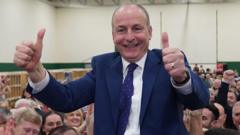Meanwhile, discussions regarding the formation of a new government are expected to commence, although Fianna Fáil's deputy leader, Jack Chambers, has suggested that an agreement might not materialize until after Christmas. The Green Party, which maintained a coalition with Fianna Fáil and Fine Gael, faced a dramatic decline, winning only one seat compared to twelve in the last election. Sinn Féin is signaling its intention to be part of negotiations with other progressive parties, with an emphasis on pressing issues such as housing, healthcare, and cost of living.
Labour’s Marie Sherlock dismissed the possibility of her party forming a government with the two larger parties without the involvement of smaller ones, asserting the importance of a broad coalition. This sentiment was echoed by Sinn Féin's Eoin Ó Broin, who asserted the necessity of collaboration among progressive factions.
However, the declining representation of the Greens and the fragmented left suggests a complex political landscape ahead, with potential for a government that may lean on coalition agreements with various smaller parties or independent candidates. The forthcoming negotiations and political maneuvers could significantly impact the policies prioritizing development and social welfare in Ireland, as leaders consider the aspirations of the electorate amidst this political shift.
Labour’s Marie Sherlock dismissed the possibility of her party forming a government with the two larger parties without the involvement of smaller ones, asserting the importance of a broad coalition. This sentiment was echoed by Sinn Féin's Eoin Ó Broin, who asserted the necessity of collaboration among progressive factions.
However, the declining representation of the Greens and the fragmented left suggests a complex political landscape ahead, with potential for a government that may lean on coalition agreements with various smaller parties or independent candidates. The forthcoming negotiations and political maneuvers could significantly impact the policies prioritizing development and social welfare in Ireland, as leaders consider the aspirations of the electorate amidst this political shift.




















